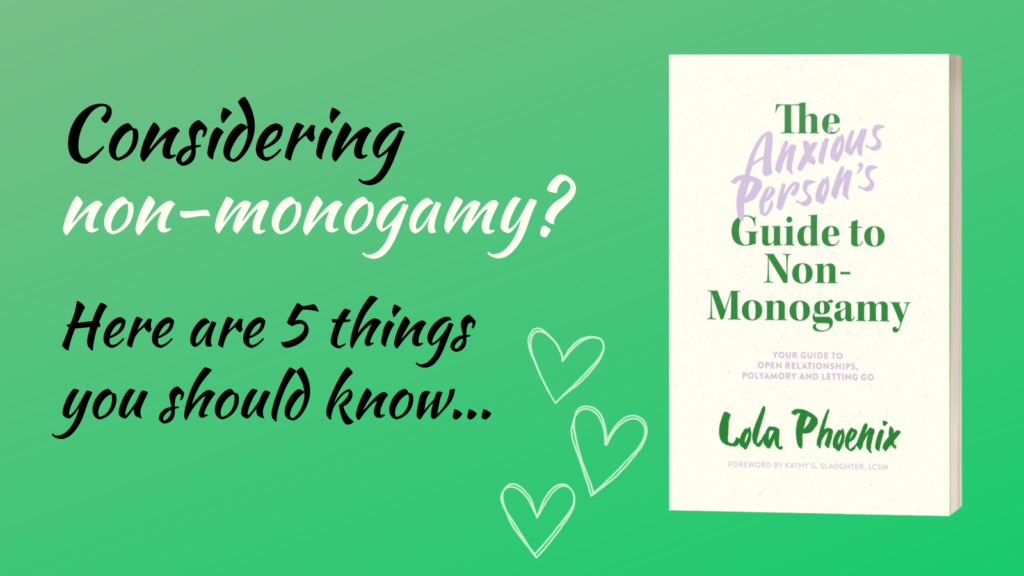
Thinking of embarking on a non-monogamous relationship but feeling slightly anxious about it all? Lola Phoenix is here to help. She runs the popular weekly relationship advice column and podcast, Non-Monogamy Help, has written a new book, The Anxious Person’s Guide to Non-Monogamy, and has been non-monogamous for over a decade – so, she is perfectly placed to offer some advice! Here are her 5 things you should know about non-monogamy.
As more people become aware that monogamy is not their only option in terms of relationship styles, many will be considering whether non-monogamy is right for them. Ultimately, I feel like whether a particular relationship style is right for you is only something that you can answer — just like only you can know whether you will be happier living in a city vs living in the country. However, there are at least five things to think about before you take the plunge.
1. Are you comfortable getting a smaller amount of attention?
There are many ways to do non-monogamy but what is true about the vast majority of non-monogamous relationships is that one does not have a situation where they have one partner who spends a good deal of time with them. There are some monogamous relationships that also have this set up, especially where they have time intensive careers or even need to be away from home for long periods. Someone can do monogamy but can’t do a relationship like that. So, can you function well in a relationship where you do not get the same amount of attention as you might usually get?
2. Do you have a personal reason for trying non-monogamy?
And no, saving your monogamous relationship is not what I mean. While I understand wanting to save your relationship, the problem is that you can’t assume that your relationship will be the same. It would be like changing your relationship to a long distance relationship to save it and expecting a long distance relationship to be the same as an in person relationship. Your personal reason for trying non-monogamy is what I call in my book ‘an anchor’ and it can be anything from curiosity about exploring your sexuality to even enjoying having more alone time at home. It’s up to you, but it should be there.
3. Are you prepared to be misjudged?
Most people don’t know about “polyamory” but many know about “open relationships” and, while I have not seen any specific data on what people believe about non-monogamy, I would not be surprised if most people believed they don’t work. The assumptions people can make about people who are non-monogamous can vary depending upon your personal identity and location. Some people may assume you are cheating on your partner if you once were recognised locally as a couple. Other people may assume that because you are non-monogamous, you are automatically sexually promiscuous and that this is a bad thing. You won’t be able to control all of the judgements people have, but understanding they might come can help you prepare.
4. Do you have access to a non-judgemental sounding board?
Jealousy is a natural human emotion that monogamous people often ask about when the subject of non-monogamy comes up and in my opinion, you won’t find very many helpful answers in how to deal with jealousy from mainstream polyamory informational sources. In my opinion, many communities equate jealous emotions with controlling behaviour — not the same thing — and don’t acknowledge jealousy as an emotion that is not only normal but useful. Having someone to speak to, whether they are non-monogamous or not, who is willing to listen to you can help you throughout this journey. A therapist would be ideal, but recognise that you might struggle to find a community that works for you locally and don’t assume that struggle represents your inability to “do” polyamory.
5. Are you wearing rose tinted glasses?
It’s easy to imagine all of the wonderful things non-monogamy could bring to your life, especially when that is something that a lot of sources have no problem sharing. But just as monogamy comes with its share of problems, so too does non-monogamy. Many people come to monogamy with misconceptions on relationships they can easily carry into polyamory. I know I absolutely did. Examining some misconceptions around about relationships, such as the ones explored in How to Not Die Alone by Logan Ury, can help you gain an understanding that can help keep you grounded.
There is a lot more you can do when you’re just getting started that I explore in The Anxious Person’s Guide to Non-Monogamy. A lot of people struggle with anxiety in relationships and, even if you don’t, trying something new like non-monogamy can bring with it an understandable amount of trepidation. I wrote my book with practical exercises in mind to help you lay a solid foundation that will help make exploring non-monogamy less difficult.
Lola’s new book, The Anxious Person’s Guide to Non-Monogamy is out now. You can follow Lola on Twitter here.